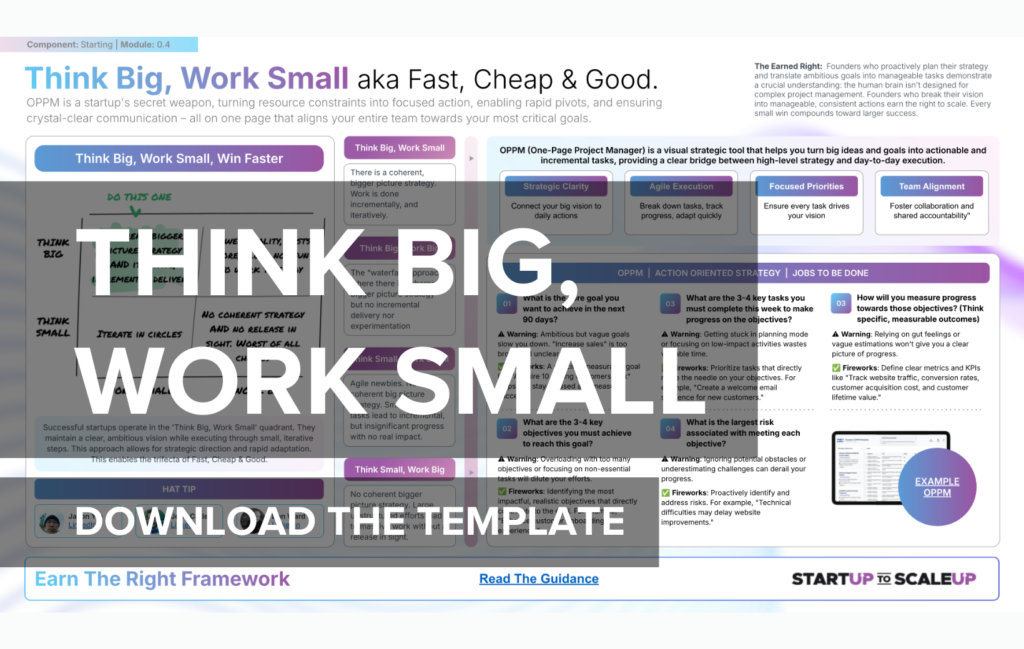How Can Startup Founders Think Big and Act Small?
What does it mean for startup founders to “think big, act small”?
“Think big, act small” is a philosophy that encourages startup founders to maintain an ambitious vision while executing through small, iterative steps. It’s about creating a cascade of focus, from your overarching vision down to your daily tasks. This approach allows founders to make consistent progress towards their goals without getting overwhelmed by the enormity of their vision.
Thinking big means having a clear, ambitious goal that may seem slightly terrifying but is achievable within a reasonable timeframe (e.g., 90 days). Acting small involves breaking down this goal into 4-5 key objectives, and further dividing those objectives into specific, actionable tasks.
How can the One Page Project Manager (OPPM) help startup founders?
The One Page Project Manager (OPPM) is a powerful tool for startup founders to visualize and manage their entire strategy on a single page. It captures everything from the big vision down to weekly tasks that move the project forward.
Key benefits of OPPM for startups include:
- Clarity: It provides a clear overview of goals, objectives, and tasks.
- Alignment: Ensures everyone on the team understands the big picture and their role.
- Flexibility: Easy to update and adapt as circumstances change.
- Focus: Helps prioritize tasks that directly contribute to main objectives.
- Accountability: Clearly shows who’s responsible for each task.
By using OPPM, founders can create a plan that’s both ambitious and achievable, keeping the team focused and agile.
What are common pitfalls founders should avoid when executing their vision?
Founders often fall into several traps when trying to execute their vision:
- Think Big, Work Big: The “waterfall” approach with a big strategy but no incremental delivery or experimentation.
- Think Small, Work Small: No coherent big-picture strategy, leading to scattered, insignificant progress.
- Think Small, Work Big: Large, unstructured efforts without a clear strategy, resulting in wasted resources.
- Define Big, Work Small (Poorly): Breaking down projects without strategic connection, leading to misaligned efforts.
The goal is to Think Big, Work Small (Effectively): Maintain a clear, ambitious vision while executing through small, iterative steps. This approach balances long-term goals with short-term action, allowing for continuous progress and adaptation.
How can startup founders effectively break down their vision into actionable steps?
Breaking down a vision into actionable steps involves:
- Define your north star: Your ultimate, long-term goal.
- Set a clear 90-day goal: Make it big, bold, and slightly terrifying, but achievable.
- Identify 4-5 key objectives: What must happen to meet your 90-day goal?
- Break objectives into tasks: What specific actions will achieve each objective?
- Work backwards: Ensure tasks lead to objectives, objectives to goal, and goal to north star.
This process creates a clear path from daily actions to your big vision, ensuring every task contributes meaningfully to your overall goals.
Why is incremental progress important for startups?
Incremental progress is crucial for startups because it:
- Builds momentum: Small wins create motivation and confidence.
- Allows for quick pivots: Shorter cycles mean faster learning and adaptation.
- Manages resources effectively: Smaller steps require less upfront investment.
- Reduces risk: Gradual progress allows for course correction with less at stake.
- Provides regular feedback: Frequent small achievements offer insights into what’s working.
By focusing on incremental progress, startups can maintain flexibility, learn rapidly, and build a solid foundation for growth.
How can founders balance long-term vision with short-term action?
Balancing long-term vision with short-term action requires:
- Clear articulation: Regularly communicate the big picture to keep everyone aligned.
- Strategic planning: Use tools like OPPM to connect daily tasks to long-term goals.
- Regular review: Assess progress and adjust plans as needed.
- Celebrate small wins: Acknowledge incremental progress to maintain motivation.
- Stay adaptable: Be willing to adjust short-term actions based on new insights.
This balance ensures that day-to-day work consistently moves the startup towards its ultimate vision, while remaining agile enough to adapt to changing circumstances.
Startup founders who master the art of thinking big while acting small position themselves for success. By maintaining a clear vision, breaking it down into manageable steps, and consistently executing, they can navigate the challenges of startup life more effectively.
It’s not about having a perfect plan, but about having a flexible, achievable strategy that evolves with your startup’s growth.
